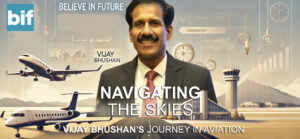INTRO
Ladies and gentlemen, welcome to a new episode of Believe in Future Amazing Mentor, the show where we dive into the narratives of those who are shaping the tomorrow we dream of. I am your host, Gaurav Garg, the founder of this expedition into the realms of innovation, mentorship, and visionary foresight.
In today’s episode, we are privileged to welcome Mr. Vijay Bhushan. With an impressive career spanning over 29 years in airport operations and leadership roles within the airline industry, and with experience in renowned airlines like Jet Airways and Emirates, he has cultivated expertise in various domains such as customer experience, team building, crisis management, and strategic planning.
Starting from his academic journey in Madhya Pradesh and later pursuing post-graduation in marketing and sales management and management and entrepreneurship, Vijay has consistently focused on enhancing his skills and knowledge. His tenure at Jet Airways, where he served as an Airport Manager, was marked by significant achievements, such as successfully opening five online stations and implementing cost-saving projects. His strategic approach to airport operations led to enhanced operational effectiveness and improved service quality.
Transitioning to Emirates as an Airport Service Manager, Mr. Bhushan continued to excel in leadership, particularly in crisis management and safety. His role involved heading airport operations at Trivandrum, where he led a team from Emirates and ground handling in customer experience, operational excellence, and people development.
Additionally, Mr. Bhushan’s involvement as Chairman of the Airline Operators Committee in Trivandrum demonstrates his commitment to industry collaboration and improvement. Under his leadership, the committee focused on facilitating dialogue, education, and advancements in airport operations, leading to notable achievements such as the approval of the in-line baggage screening system and the introduction of the Automated Baggage Reconciliation system.
Overall, Mr. Vijay Bhushan’s career reflects a strong blend of leadership, operational excellence, and a proactive approach to addressing challenges in the dynamic aviation industry. His commitment to continuous improvement and collaborative efforts underscores his effectiveness in driving positive change within airport operations.
It’s a pleasure to welcome Mr. Vijay Bhushan to our show, Amazing Mentor. Welcome, sir.
Tell us about some of your favorite subjects from your school days and why those particular subjects were your favorites.
To be frank, I grew up in the deep south of India, but my childhood and schooling were in the central part of India, in Madhya Pradesh. We lived in small towns as my father was a government servant. When it comes to schooling, I attended both government and English medium schools. My basic interests in subjects were mathematics, social studies, and history. Mathematics, in particular, was my favorite, though I’m not quite sure where that interest came from. It was just something that clicked with me.
Do you have any memorable or mischievous moments from your college days?
One memorable incident comes to mind. My government college organized a science exhibition where I displayed a project on the Star Wars initiative by the U.S. I was a second-year mathematics student at the time. The exhibition attracted a large crowd, and I vividly remember explaining how missiles would operate, using diagrams to illustrate the concept. It was one of those rare moments when a student like me was recognized by the public for my work. It remains one of the most memorable experiences of my college days.
Can we say that the Star Wars project was the inspiration for your career in the aviation industry?
Not exactly. Aviation was more of an accidental career choice for me. Growing up in Madhya Pradesh, aviation wasn’t even a dream for most people. Until I joined Jet Airways in 1993, I had never seen an aircraft or an airport. After my father’s retirement, we moved to Trivandrum, and that’s where I first encountered the aviation industry. My original dream was to join the Army, influenced by friends whose parents were in the military. But fate led me to aviation, and I believe it was the right path for me.
Did you ever get into trouble for a prank or mischievous activity in school?
Honestly, I was a mature and quiet student during my school days. I wasn’t involved in any mischievous activities. I was more of an average student, focused on my studies, especially in mathematics, which I found challenging. But I managed to complete my studies decently and without causing any trouble.
Who was your biggest inspiration during your childhood and why?
My biggest inspiration during my childhood was my father. He used to subscribe to The Times of India, which would arrive a day late from Delhi. Reading that newspaper, particularly the business columns, sparked my interest in the corporate world and how achievements were reported. Although I never initially intended to go into business, my fascination with the corporate world grew during my college years, and it eventually influenced my career choices.
Apart from the Army, what was your dream profession when you were growing up?
Apart from the Army, my dream was to become an engineer, following in my father’s footsteps as a civil engineer. Unfortunately, I didn’t clear the entrance exams for engineering, but instead of wasting my father’s money on private colleges, I decided to pursue a B.Sc. in a government college. I believe destiny had other plans for me, leading me to aviation instead.
Do you have any favorite childhood stories or fairy tales?
Not so much fairy tales, but religious stories had a significant impact on me. My father was quite religious, and every evening we would read from the Valmiki Ramayana. The values and lessons from those readings, especially the ideals of Lord Ram, left a lasting impression on me. The emphasis on truth and righteousness has guided me throughout my life.
Did you have any special traditions or rituals in your family while growing up?
Yes, one of the rituals that had a profound impact on me was the annual pilgrimage to Sabarimala. The 41-day vrutham (fasting and penance) that precedes the pilgrimage brought a lot of mental calmness and discipline into my life. Additionally, being from a South Indian family, temple visits and the associated rituals played a significant role in shaping my values.
What was your first job after completing your education, and how did you land it?
After completing my post-graduate diploma in Marketing and Sales Management, I was offered a job at Dabur as a regional trainee. However, due to delays in obtaining my certificates, I couldn’t join. My first job in aviation was with Jet Airways, starting on September 2, 1992. Although there were delays in the project, I eventually joined as a Customer Service Agent at the airport in Coimbatore. Jet Airways was my first job in aviation, and I worked there for 18 years before moving to Emirates.
How was your experience when you received your first paycheck?
My first paycheck was a consolidated salary of INR 2,500. It was a significant amount for me at the time, especially working for an airline. I remember having to open an account at Canara Bank to deposit the check. It was a moment of pride and accomplishment.
Were there any challenges you faced in transitioning from college life to the professional world?
The transition was challenging, particularly because Jet Airways was a new airline, and most of the staff, including myself, were fresh recruits. We had to learn on the job, often working long hours. The management created an environment that made us feel like we owned the airline, which motivated us to give our best every day. It was a learning experience that taught me the value of hard work and commitment.
What were some of the most important lessons you learned during your early years in the workforce?
The most important lessons I learned were the value of customer engagement, the importance of continuous learning, and the need to adapt to new challenges. My philosophy has always been that there are no shortcuts in life; you have to go step by step and learn the details. These lessons have stayed with me throughout my career.
What were some of the key milestones or achievements you reached during the early stage of your career?
One of my early achievements was being selected for the Load and Balance department, a critical function in aviation that ensures the safe distribution of weight in an aircraft. I also specialized in safety and crisis management, two essential areas in aviation. My communication skills, developed from reading English newspapers during my school days, also played a significant role in my career progression. These early milestones laid the foundation for my later success.
Did you face any setbacks or obstacles along the way, and how did you overcome them?
Yes, there were challenges, particularly in dealing with infrastructure constraints at Indian airports. As the number of passengers increased, airports struggled to manage the crowds. We had to work closely with airport operators and regulatory authorities to ensure smooth operations. These challenges taught me the importance of being adaptable and proactive in finding solutions.
Did you have any mentor or role model who guided you in your professional development, and how did they impact your journey?
I didn’t have one specific mentor or role model, but I was greatly influenced by the work culture of Singaporean managers. Their systematic approach, transparency, and open communication style left a lasting impression on me. I have always strived to emulate those qualities in my own leadership style.
How did your early experiences shape the professional you are today?
My early experiences at Jet Airways, where I was exposed to top-class management from around the world, shaped my approach to customer service and operational excellence. The diverse talent pool and the focus on customer satisfaction were key influences that have guided my career ever since.
What were the biggest challenges you encountered during the early stages of your career?
One of the biggest challenges was adapting to the local culture and language when I moved from Madhya Pradesh to Coimbatore. Learning Tamil and understanding the local customs were essential for building relationships and succeeding in my role. Additionally, the lack of documentation and regulatory clarity in the early days of Indian aviation required us to learn and adapt on the go.
In your opinion, what are the essential skills that every professional should possess to succeed in their early days?
Communication skills, teamwork, and adaptability are crucial for success in the early stages of a career. Being able to communicate effectively, work well with others, and adapt to changing situations are the keys to long-term success.
Can you share an example of a challenge you faced in your early career, and how you tackled it?
One of the most challenging situations I faced was in Doha during the Christmas vacation season. We had overbooked a flight, and there were 100 passengers with valid tickets who couldn’t board. It was a crisis, but we managed it by communicating transparently with the passengers, arranging a ferry flight, and ensuring that everyone reached their destination the next day. It was a tough situation, but teamwork and clear communication helped us resolve it successfully.
How do you approach problem-solving and decision-making when confronted with difficult situations?
Truth and transparency are my most powerful tools. When faced with a problem, I believe in being honest about the situation and working collaboratively with my team to find the best solution. In difficult situations, it’s important to communicate clearly with everyone involved and to remain calm and focused on resolving the issue.
Have you ever been in a situation where you had to go against your management to solve a challenge?
Fortunately, both Jet Airways and Emirates were passenger-friendly organizations that supported frontline managers in making decisions that benefited both the company and the customers. I’ve never had to go against management, as they always provided the necessary support for making the right decisions.
What criteria do you use to prioritize challenges and address them first?
When solving problems, I divide the issue into different phases and prioritize each aspect accordingly. For example, in a denied boarding situation, I would first identify passengers who are willing to give up their seats voluntarily. It’s about understanding the different components of a problem and addressing each one methodically.
How do you ensure that solutions implemented remain effective over time, especially as circumstances change?
Aviation is a dynamic industry, and every day brings new challenges. While the fundamentals of customer service and safety remain constant, we need to be flexible and adapt our solutions to changing circumstances. Continuous improvement and regular feedback are essential to ensuring that solutions remain effective.
Can you share an example of a challenge that provided an important learning opportunity for you?
The Emirates aircraft incident in August 2016, where an aircraft went into crisis after landing in Dubai, was a significant learning experience. The crisis management practices and emergency procedures we had in place allowed us to evacuate all passengers safely. It reinforced the importance of being prepared for any situation and having robust SOPs in place.
What inspired you to pursue a career in airport operations and airline management?
What inspires me most is the opportunity to meet new people every day, from top corporate executives to humble travelers. The dynamic nature of aviation, the satisfaction of doing a good job, and the chance to contribute to the growth of the industry keep me motivated.
What has been the most memorable moment of your career so far?
One of the most memorable moments for me is landing in Dubai, flying business class with one of the top five airlines in the world. Coming from a small town and achieving this level of success is something I’m incredibly proud of. It’s a reminder of how far I’ve come and the opportunities that lie ahead.
How has the definition of the aviation industry changed in your mind over the years?
When I joined the aviation industry in 1993, air travel was considered a luxury, accessible only to the elite. Today, it’s a normal mode of transport, and the industry has grown significantly. The focus has shifted from luxury to efficiency and accessibility, making air travel available to a much broader audience.
How have you used challenges as opportunities for growth and development in your career?
I believe that every challenge is an opportunity for growth. Rather than seeing challenges as obstacles, I view them as chances to learn and improve. This mindset has helped me navigate difficult situations and emerge stronger each time.
How have major transitions or changes in your career path impacted your growth and development as a professional?
Each transition in my career has brought new challenges and learning opportunities. Whether it was moving from Jet Airways to Emirates or taking on leadership roles, these changes have helped me grow as a professional. Now, I focus on using my experience to mentor and develop the next generation of aviation leaders.
How has your career evolved over time, from your early days to your current role?
My career has evolved from simply having a job to making a significant impact in the aviation industry. The exposure I’ve had to different cultures, management styles, and international operations has equipped me with the skills and confidence to contribute to the growth of the industry in meaningful ways.
Have there been any unexpected twists or surprises in your career journey that have led to new opportunities or directions?
One unexpected challenge was being pulled into regulatory checks due to issues unrelated to my role. While it was mentally taxing, it reinforced the importance of transparency and accountability in our work. It also highlighted the need for clear communication with regulatory agencies to avoid misunderstandings.
As an Airport Service Manager, you likely interact with various stakeholders, including airline executives, airport authorities, and regulatory bodies. How do you handle pressure from these stakeholders, especially when their interests conflict?
Handling conflicts of interest between stakeholders requires diplomacy and adaptability. I believe in listening carefully during meetings and addressing concerns in a calm and assertive manner. Informal interactions, such as tea breaks, often provide a better platform for resolving issues than formal meetings.
The role of an Airport Service Manager can be demanding and often involve long hours and unpredictable schedules. How do you maintain a healthy work-life balance despite the pressure of your profession?
Maintaining a healthy work-life balance is challenging in this industry, but I’ve learned to manage it by staying adaptable and taking care of my health. Simple habits like eating in moderation and getting enough rest help me stay focused and energized.
What are the differences in the approach to innovation and technology adoption between Jet Airways and Emirates?
Jet Airways was a pioneer in Indian aviation, introducing many firsts in the industry. However, being an Indian company, it had limitations in terms of budget and resources. Emirates, on the other hand, prioritizes technology adoption and invests heavily in innovation. Both airlines have their own merits, and each has contributed to my understanding of how technology can enhance operational efficiency.
How does Emirates incorporate feedback from vendors to drive continuous improvement in its vendor management practices?
While I’m not directly involved in vendor management at my level, I know that customer feedback is taken seriously and used to improve services. Emirates places a strong emphasis on continuous improvement, and feedback is a critical part of that process.
Based on your experience, what do you believe are the keys to success in your field?
The keys to success in my field are transparency, effective communication, adaptability, teamwork, and recognizing and honoring your team. These values have guided me throughout my career and have been crucial to my success.
What advice would you give to someone just starting their career in the aviation industry?
My advice is to be transparent, face challenges head-on, and develop strong communication skills. The aviation industry is dynamic and offers endless learning opportunities. Embrace the challenges, and you’ll find immense satisfaction in your work.
If you could go back and give your younger self advice as you were starting your career, what would it be?
I would advise my younger self to be transparent, adaptable, and to focus on communication skills. These qualities are essential for long-term success.
Many young professionals may face transitions between different roles or organizations early in their careers. What advice do you have for navigating these transitions successfully?
Embrace the challenges that come with transitions, as they are opportunities for growth. Prepare yourself mentally for the challenges, and you’ll find that they ultimately benefit your career in the long run.
Now, let’s start our rapid round. What is the most critical aspect of airport operations management?
The most critical aspect is being dynamic and adaptable to change, as no two days are the same in airport operations.
How do you prioritize safety in airport operations?
Safety is the number one priority. The safety of staff, passengers, and stakeholders is paramount in the aviation industry.
What is your approach to handling passenger complaints effectively?
My approach is to prioritize the passenger’s benefit while ensuring the company doesn’t lose out. Offering multiple solutions allows the passenger to choose what works best for them.
How do you ensure compliance with aviation regulations at your airport?
Compliance with aviation regulations is non-negotiable. We must follow all rules, SOPs, and guidelines to ensure safety and productivity.
What technology or tools do you use to enhance operational efficiency?
We use advanced check-in systems, loading technologies, and tools like baggage tracking systems to enhance efficiency and provide better service to our customers.
How do you foster a culture of teamwork among airport staff?
Understanding each team member’s strengths and weaknesses is key. Transparency, equality, and recognizing individual contributions help foster a strong team culture.
What role does customer feedback play in improving airport services?
Customer feedback is essential for identifying gaps in our service and making improvements. It’s the best way to ensure that we’re meeting our customers’ needs and expectations.
What is one line that defines you?
I want to be a catalyst for the aviation industry, helping it reach new heights in this decade of growth for Indian aviation.
As we bring this riveting episode of Believe in Future Amazing Mentor to its conclusion, I would like to express my heartfelt appreciation for our distinguished guest, Mr. Vijay Bhushan, for sharing his invaluable experience and wisdom with us.
Mr. Vijay Bhushan’s career stands as a testament to his unwavering dedication and expertise in airport operations and leadership within the airline industry. With a track record of success at renowned airlines like Jet Airways and Emirates, he has consistently demonstrated a knack for driving operational excellence, enhancing customer experience, and navigating complex challenges.
As he continues to lead teams and spearhead initiatives, Vijay remains a beacon of innovation and collaboration, shaping the future of airport operations with his strategic vision and unwavering commitment to excellence. His legacy of achievements and impact serves as an inspiration to aspiring professionals in the aviation sector, underscoring the importance of leadership, adaptability, and a relentless pursuit of excellence in every endeavor. With Vijay Bhushan at the helm, the future of airport operations shines brighter than ever before.










+ There are no comments
Add yours